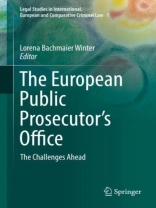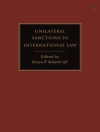This book explores the European Public Prosecutor’s Office (EPPO), the creation of which was approved in the Regulation adopted by the Justice and Home Affairs (JHA) Council on 12 October 2017.
The EPPO will be an independent European prosecution office tasked with investigating and prosecuting those crimes defined in the recently adopted Regulation 2017/1371 on combating fraud against the Union’s financial interests by means of criminal law. As such, it will be a new actor on the EU landscape, governed by the principle of loyal cooperation with the national prosecuting authorities.
This work clarifies some of the challenges that member states will have to face when dealing with a supranational prosecution authority. In addition, it provides guidelines on how to implement the present Regulation while respecting the fundamental rights of defendants in criminal proceedings.
The book is of special interest in so far as the analysis and perspectiveof academics is completed with the contributions of legal experts who have either been involved in the negotiations to establish the European public prosecutor or will be closely linked, as public prosecutors, to the functioning of the future European public prosecutor’s office.
Inhoudsopgave
Antonio Martínez Santo, The status of independence of the European Public Prosecutor’s Office and its guarantees.-
David Vilas Álvarez, The material competence of the European Public Prosecutor’s Office.-
Helmut Satzger, The European Public Prosecutor’s Office and its coordination with the national public prosecutor’s office: The model of complementarity.-
Michele Panzavolta, Choosing the national forum in proceedings conducted by the EPPO: Who is to decide?.-
Jorge A. Espina Ramos, The relationship between Eurojust and the European Public Prosecutor’s Office.-
Michele Caianiello, The decision to drop the case: Res iudicata or transfer of competence?.-
Lorena Bachmaier Winter, Cross-border investigations under the EPPO proceedings and the quest for balance.-
Silvia Allegrazza and Anna Mosna, Cross-border criminal evidence and the future European Public Prosecutor: One step back on mutual recognition?.-
Mercedes de Prada Rodríguez and Antonio Zárate Conde, Transactions and ‘simplified procedures’ in the framework of the European Public Prosecutor’s Office: A national perspective.-
Giulio Illuminati, Protection of fundamental rights of the suspect or accused in transnational proceedings under the EPPO.-
Stefano Ruggeri, Criminal investigations, interference with fundamental rights and fair trial safeguards in the proceedings of the European Public Prosecutor’s Office: A human rights law perspective.-
Nuria Díaz Abad, The legal framework of the protection of fundamental rights of the supected or accused in transnational proceedings under the EPPO.-
Pedro Pérez Enciso, Exchange and processing of information between the European Public Prosecutor’s Office and national authorities: The case management system.












